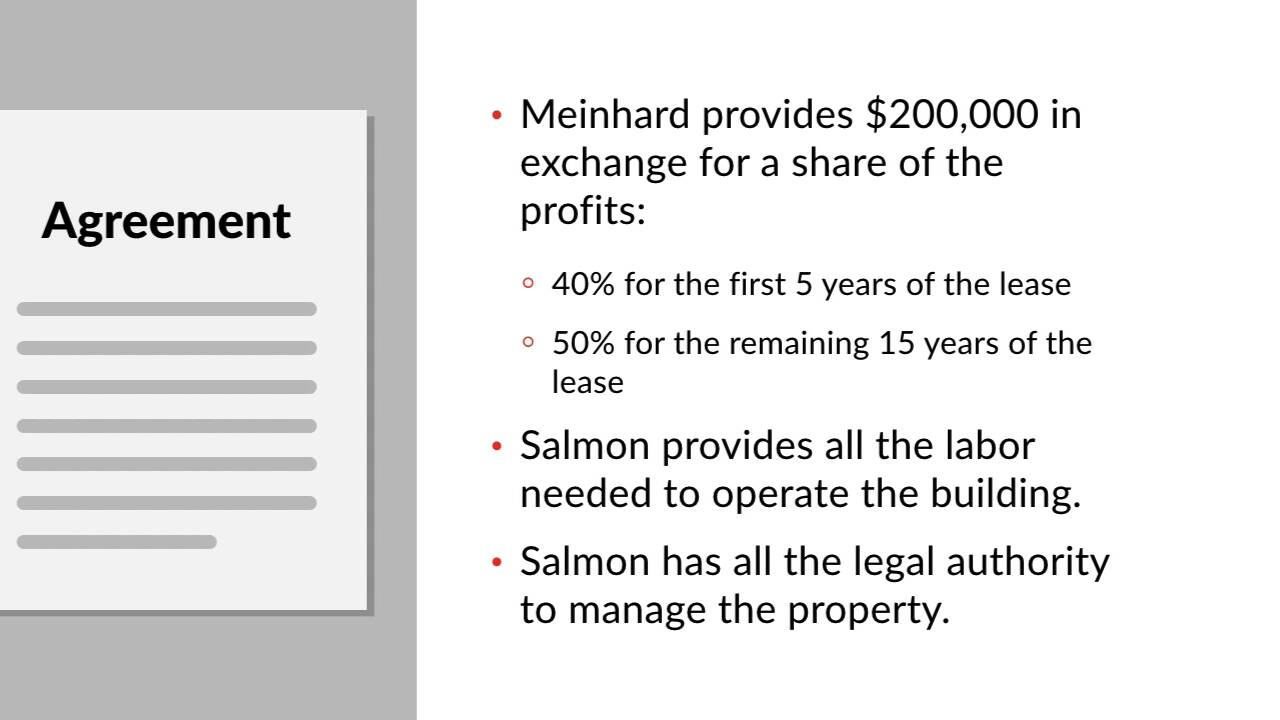Meinhard v salmon case brief – In the realm of business partnerships, the Meinhard v. Salmon case brief stands as a beacon of legal precedent, shaping the very foundations of fiduciary duties and responsibilities. This captivating narrative delves into a compelling legal dispute, exploring the intricacies of loyalty, good faith, and the consequences of their breach.
The case revolves around the conflict between Meinhard and Salmon, two partners in a real estate venture. As we delve into the details, we’ll uncover the specific actions that constituted a breach of fiduciary duty, the equitable remedies granted by the court, and the profound impact this case has had on the law of business partnerships.
Case Overview

The legal dispute between Meinhard and Salmon arose from a joint venture to purchase and develop a hotel property. Meinhard provided the financing, while Salmon managed the project. The court found that Salmon had breached his fiduciary duty to Meinhard by secretly acquiring an interest in the property for himself, without Meinhard’s knowledge or consent.
The court held that Salmon’s actions constituted a breach of the fiduciary duty of loyalty that he owed to Meinhard as his joint venturer. The court ordered Salmon to account for the profits he had made from his secret interest in the property and to pay them over to Meinhard.
Fiduciary Duty of Loyalty
The fiduciary duty of loyalty requires that a fiduciary act in the best interests of the beneficiary and avoid conflicts of interest. In the context of a joint venture, each joint venturer owes a fiduciary duty of loyalty to the other joint venturers.
This duty requires that a joint venturer:
- Act in good faith and in the best interests of the joint venture
- Avoid conflicts of interest
- Disclose all material information to the other joint venturers
- Account for any profits made from the joint venture
Fiduciary Duty
In business partnerships, fiduciary duty refers to the legal obligation of partners to act in the best interests of the partnership and its members. This duty arises from the trust and confidence placed in each partner to manage the partnership’s affairs fairly and responsibly.
In the case of Meinhard v. Salmon, the court held that Salmon owed a fiduciary duty to Meinhard due to their partnership relationship. This duty included specific obligations, such as:
Obligation to Account for Profits
- Salmon was obligated to disclose all profits and benefits he obtained from the partnership to Meinhard.
- He could not secretly profit from opportunities that arose out of the partnership without sharing them with Meinhard.
Obligation to Avoid Conflicts of Interest
- Salmon was required to avoid situations where his personal interests conflicted with the interests of the partnership.
- He could not compete with the partnership or use its resources for his own personal gain.
Obligation to Exercise Care and Diligence
- Salmon had a duty to manage the partnership’s affairs with care and diligence.
- He was responsible for protecting the partnership’s assets and making sound decisions in its best interests.
Obligation to Maintain Confidentiality
- Salmon was obligated to keep confidential any sensitive information about the partnership’s affairs.
- He could not disclose this information to third parties without the consent of Meinhard.
Breach of Fiduciary Duty

Salmon’s actions constituted a clear breach of his fiduciary duty to Meinhard. As a joint venturer, he had a duty to act in Meinhard’s best interests and to avoid any conflicts of interest. However, Salmon violated these obligations by:
Self-Dealing
- Purchasing the property at a foreclosure sale without informing Meinhard, despite knowing that Meinhard was interested in the property and had offered to purchase it.
- Forming a new corporation with a third party to purchase the property, effectively excluding Meinhard from the venture.
Concealment of Information
- Failing to disclose to Meinhard that he had purchased the property at the foreclosure sale.
- Misrepresenting to Meinhard that he had not been able to purchase the property.
These actions demonstrate that Salmon prioritized his own interests over Meinhard’s and breached the standards of loyalty and good faith required of a fiduciary.
Equitable Remedies
To redress the breach of fiduciary duty, the court granted Meinhard several equitable remedies. These remedies aimed to restore Meinhard’s rightful position and prevent Salmon from profiting from his wrongdoing.
The primary equitable remedy was a constructive trust, which imposed a legal obligation on Salmon to hold the profits he had gained from the joint venture in trust for Meinhard. This remedy essentially stripped Salmon of his ill-gotten gains and restored them to Meinhard, the rightful owner.
The Meinhard v. Salmon case brief illustrates the importance of fiduciary duties. This concept is particularly relevant for those preparing for the MTA police exam, as they will need to understand ethical considerations in law enforcement. For a comprehensive study guide on this topic, refer to the MTA Police Exam Study Guide . The guide provides valuable insights into the Meinhard v.
Salmon case brief and other key concepts related to fiduciary duties.
Accounting of Profits, Meinhard v salmon case brief
In addition to the constructive trust, the court also ordered Salmon to provide an accounting of all profits he had made from the joint venture. This accounting required Salmon to disclose all financial transactions related to the venture, ensuring transparency and accountability.
Dissolution of the Joint Venture
Finally, the court ordered the dissolution of the joint venture. This remedy severed the legal and financial ties between Meinhard and Salmon, preventing Salmon from further exploiting the venture for his own benefit.
Impact on Business Partnerships
The Meinhard v. Salmon case played a pivotal role in shaping the legal landscape of business partnerships. It established fundamental principles that guide the conduct of partners and define their fiduciary responsibilities.
The case emphasized the utmost importance of loyalty, trust, and good faith in partnership relationships. Partners are expected to act in the best interests of the partnership and refrain from self-serving actions that could harm the business or its members.
Expectations and Responsibilities of Partners
- Duty of Loyalty:Partners must prioritize the partnership’s interests over their personal gains. They cannot compete with the partnership or engage in activities that conflict with its objectives.
- Duty of Care:Partners have an obligation to exercise reasonable care and diligence in managing the partnership’s affairs. They must make informed decisions and act prudently to protect the partnership’s assets and reputation.
- Duty of Disclosure:Partners are required to disclose all material information that may affect the partnership’s decisions. They must avoid concealing or misrepresenting facts that could impact the partnership’s operations or profitability.
- Duty of Accounting:Partners must maintain accurate and complete financial records and provide regular accounting to other partners. They must also account for any profits or benefits they derive from the partnership.
Commonly Asked Questions: Meinhard V Salmon Case Brief
What is the significance of the Meinhard v. Salmon case?
The Meinhard v. Salmon case established the concept of fiduciary duty in business partnerships, requiring partners to act in good faith and loyalty towards each other.
What specific actions constituted a breach of fiduciary duty in this case?
Salmon breached his fiduciary duty by secretly acquiring a leasehold interest in the partnership property without informing Meinhard.
What equitable remedies were granted to Meinhard?
Meinhard was granted an injunction to prevent Salmon from exploiting the leasehold interest and was awarded a share of the profits from Salmon’s secret dealings.